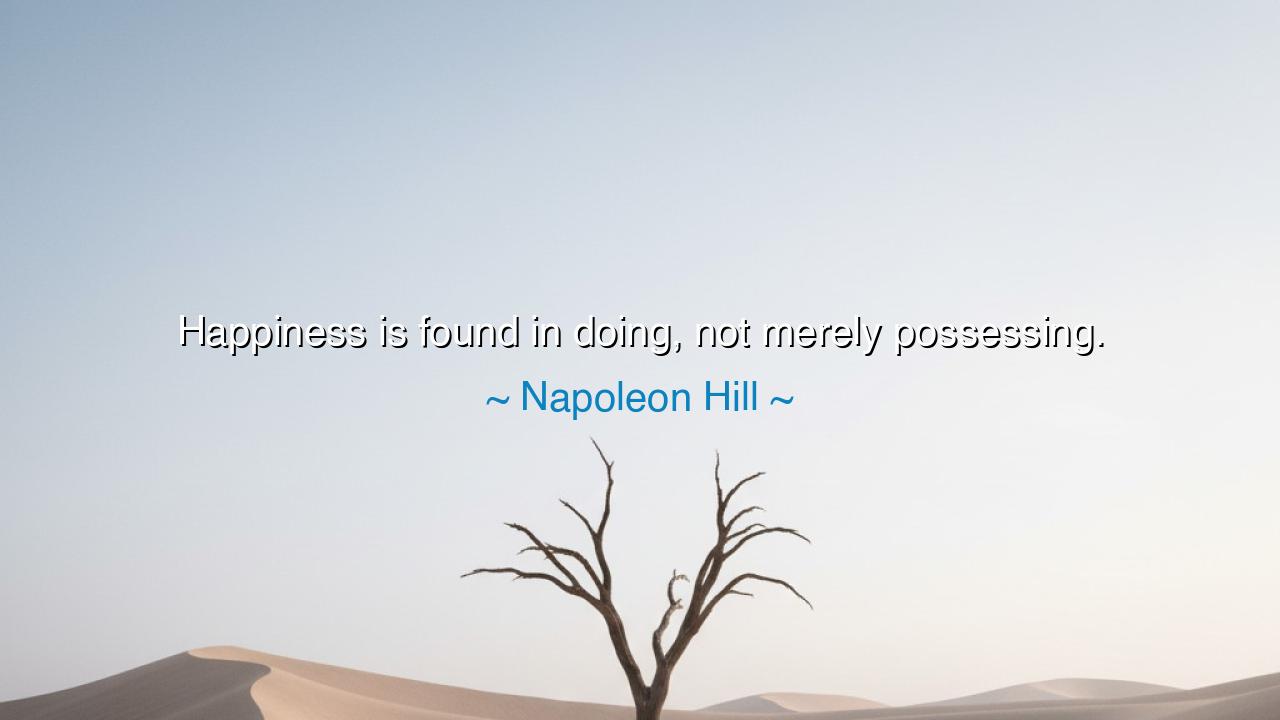
Happiness is found in doing, not merely possessing.






“Happiness is found in doing, not merely possessing.” Thus spoke Napoleon Hill, the philosopher of progress and the architect of ambition, whose teachings on success continue to awaken the sleeping strength within mankind. In this single sentence, he unveils a truth that the wise have known since the dawn of thought: that happiness is not the fruit of possession, but the fire of action. To do, to strive, to create—this is the rhythm of the human spirit. Possession is stillness, but doing is life itself. For in the act of becoming, the soul feels its own power, and in that power, it rejoices.
Hill’s words were born from his long study of the lives of those who rose from obscurity to greatness. He walked among men of enterprise—Thomas Edison, Henry Ford, Andrew Carnegie—and he discovered that none of them found joy merely in the things they owned, but in the things they built. To possess is to close a circle; to act is to open one. The first ends desire; the second renews it. Possession satisfies the body, but doing nourishes the soul. Hill saw that happiness is not a resting place, but a journey of creation, a movement of the heart toward purpose.
To possess alone is to grow stagnant, like water trapped in a still pool. The riches of the idle man soon turn to dust, for without movement, the spirit decays. But the one who does, who labors, who dreams and builds—his joy flows like a river. The moment of creation is holy, for it is there that man becomes most like the divine. The craftsman at his workbench, the mother nurturing her child, the thinker shaping ideas into words—all feel the same sacred fire. Their happiness comes not from what they hold, but from what they bring into being.
Consider the life of Mahatma Gandhi, who owned almost nothing and yet carried within him an inexhaustible peace. He wore simple cloth, ate simple food, and walked barefoot across the dust of India. Yet in his doing—in his struggle for truth and justice—he discovered a joy deeper than any luxury could give. His life was not rich in possessions but in purpose, not measured by wealth but by the impact of his actions. Gandhi’s happiness was the kind that Hill describes: the serenity of the one who lives his beliefs, who finds meaning not in having, but in being and doing.
The tragedy of many is that they seek joy through accumulation, not through creation. They gather wealth, trophies, and titles, believing that happiness lies at the end of acquisition. But when they have all they desired, they find themselves empty still. For things cannot fill the soul, only motion can. The artist is happiest not when his masterpiece is finished, but while his brush still moves. The explorer rejoices not at the end of his journey, but in every step upon the road. The human heart is not made for hoarding—it is made for becoming.
In this, Hill’s teaching mirrors the wisdom of the ancients. The philosopher Aristotle once wrote that happiness is not a possession, but an activity of the soul in accordance with virtue. To live rightly, to act meaningfully, to use one’s gifts in service of good—this is the essence of joy. It is not what we hold, but what we give of ourselves that brings contentment. The wise man therefore does not ask, “What do I own?” but “What have I done today to make the world more alive?”
So let this truth be carried forward: Happiness is motion. It is found not in treasures, but in the work of the heart and the labor of the hands. To those who feel weary or unfulfilled, begin again to do—create, serve, learn, strive. Let your actions be your wealth, your growth your glory. Fill your days with purpose, not possessions; for possessions fade, but deeds endure. As Napoleon Hill taught, happiness is not a prize to be stored on a shelf—it is the flame that burns only while you move, only while you dare, only while you live.






AAdministratorAdministrator
Welcome, honored guests. Please leave a comment, we will respond soon